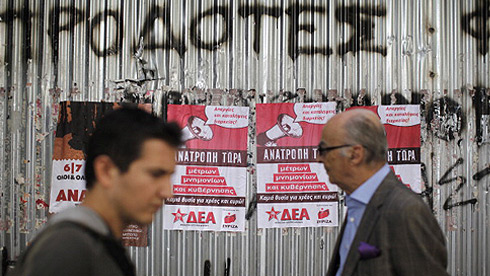Some 8.9 per cent of the Netherlands’ working population, around 675,000 people in the prime of life, are currently unemployed. And the Netherlands is no exception, throughout western Europe, some 8 million youngsters are not only unemployed, but are not receiving any further training either. Just a few months ago, The Economist calculated that since the beginning of the crisis in 2007, youth unemployment in the western world has risen by some 30 per cent, affecting a total of 26 million people.
And it is only common sense to presume that this is bound to have consequences: a fact that has been understood by Europe’s leaders. Germany’s Chancellor Merkel has singled out youth unemployment as Europe’s most pressing problem, insisting that we are now faced with the threat of a "lost generation". With leading figures voicing increasingly urgent calls for action, there is a growing awareness of the gravity of the problem, which has prompted the general public to pose the question of what sort of initiatives are likely to help.
Crisis of political conviction
As part of a new EU programme, the European Union is to set aside €8bn for the Europe’s worst affected countries – Greece, Spain, Portugal – which is to be spent over the next two years. The European Investment Bank has also pledged to assist in the fields of youth training and funding for small businesses, etc. But will it help? Let’s hope it does.
The issue is complicated because the crisis we are experiencing is not a purely economic one. Both western Europe and the US are also facing a crisis of political conviction. [[As it stands, no single party or political leader has succeeded in mobilising the imagination of the masses]]. Across the western world, political elites have been beset by a clear sense of dejection for several years now. Wars of intervention have failed, and the vast majority have been confronted with the further gradual decline of the economy. The general sentiment among citizens has become one of grumpiness and impatience, and it is one that is being reinforced on a daily basis. The latest justification for this disposition has come in the form of footage shot in Detroit, once the global centre of the automotive industry, which now lies in ruins and has become a hotbed of crime.
[[The current crisis is a departure from a prosperous and optimistic past in every respect]]. And this raises the question of the response of future generations. We have previous experience of generational conflicts, the most historic and shocking of which led to the rise of the Third Reich, which emerged against a backdrop of acute economic crisis in the 1930s, but was also buoyed by desire for revenge in the wake of the loss of World War I, the weakness of the Weimar Republic and Hitler’s oratorical skills.
It is certainly not my intention to warn about the emergence of "a new Hitler". There is no such figure. My point is to establish that he succeeded in appealing to the German people in the 1930s, as Sebastian Haffner explains in his essay, Anmerkungen zu Hitler (The Meaning of Hitler). Quite apart from his rearmament of the nation and his foreign policy, Hitler breathed new life into German industry and effectively combated unemployment. And the fact that he proved so successful was largely due to a substantial divide between the generations.
Generation gap
We in the Netherlands also experienced this phenomenon relatively recently. And it was one that marked my life, having witnessed as teenager both WWII and the Dutch famine of 1944. The years following the liberation of the Netherlands failed to yield a political breakthrough, but instead heralded the war with Indonesia, which saw us ship some 150,000 troops to the other side of the world, only to lose. The government of the time thought that it could simply return to business as usual at home. But it was mistaken. The first evidence of a gap between the generations came with the novel Ik heb altijd gelijk “I am Always Right” (1951) by W.F.Hermans, which is compulsory reading for anyone keen to learn the possible effects of this type of conflict. Thereafter Dutch literature was also marked by the "Vijftigers", the [anarchist counterculture movement of the] "Provo’s", and the "krakers" or squatters’ movement.
A generation gap is not easily managed. And as time went by, it became clear that the Netherlands of the pre-war years had finally become obsolete.
Thereafter, we had several generations who grew up with the discipline of the Cold War. Then with 1989, a new era gradually emerged. Now the question is: how will those who were around 10 years old in 1990, and experienced the welfare expansion of that decade and the creeping decline of the one that followed, respond to the apparent incurability of the current crisis? What will be the impact of social media on this lost generation? Is there a new resistance smouldering, just waiting to catch flame? And how will it manifest itself? [[Could this be a good idea for the plot of prophetic movie, or even socio-political documentary?]]
The thing we suffer mostly from these days, I sometimes think, is a sense of imagination, and without even being aware of it.
Was this article useful? If so we are delighted!
It is freely available because we believe that the right to free and independent information is essential for democracy. But this right is not guaranteed forever, and independence comes at a cost. We need your support in order to continue publishing independent, multilingual news for all Europeans.
Discover our subscription offers and their exclusive benefits and become a member of our community now!












